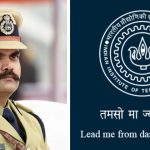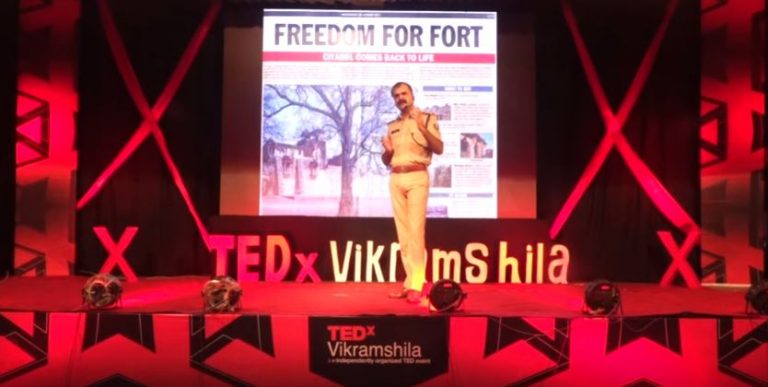Mr. Vikas Vaibhav, an IPS officer who has the background from IIT. He loves to teach the students and explores the heritage archaeological sites. He is so pro-people that organizes regular durbar to hear people’s complaints. Here, is the full text of his recent talk given at a TEDx event.
A very good afternoon to all of you assembled here. I am an IPS officer of 2003 batch, borne into the Bihar cadre. I hail from Bihar, from a district called Begusarai.
In the 16 years or so that I spent in the Police service, I have served in different capacities in Bihar and also in the National Investigation Agency at New Delhi. Even, I have had varied experiences, experiences encountering criminals, encountering law breakers, on a different side of law, but a very different journey which started, was an encounter with heritage. So, the moment when I was invited for this talk, the name TEDx Vikramshila stuck. The name may not ring a bell to most of the youth today, but, for me it means a lot.
When I think of Vikramshila, it takes me back to the times, about a thousand years back, when in the whole of Tibet people were looking for knowledge. The then king Lha Lama, he wanted to invite a teacher from India, a teacher who would correct things right, and put them in the right perspective of Buddhism. And after the persuasion of three years, finally the story of Atisa in Tibet begins. He has inspired generations of Tibetans. The light of Vikramshila continues to the day. So, TEDx Vikramshila made me feel to remember that glory, that heritage, and, standing as I am on the remains of Champa…
As a small child, I would read Buddhist texts being referred in books of history. And, whenever Champa was referred, it was being referred to as “the first city of the world”. When I looked at the present, the dilemma and the paradox was well felt. One could not relate the past with the present.
Later, as the years continued, a simple search on the internet cleared many of my dilemmas. The Champa which lies buried, which has not been excavated, and, on which I am standing at present, had various trade relations with parts of South East Asia, with different countries. And, this Champa inspired an entire civilization in what we presently know as Vietnam. From the 2nd century AD to 17th century AD, this very place, the place I am standing, it inspired a whole civilization. So, when I look back at the journey, why I am talking about heritage; it may sound very strange; a police officer talking on heritage; but, that is how my life has been right from the very days of early childhood.
My father has now retired. He used to work with the Indian Oil Corporation. It was a transferable job. In early childhood, I received my early Schooling in Assam, in Guwahati. Very soon my father got transferred to Barauni Refinery. In Barauni, I spent several years of my School up to Std. 8th. At that point of time, during those years, I came across the remains of Nalanda. As I roamed around the remains, immediately, the young School boy’s mind was ignited. Something did not seem to be connected with the past.
In those days, on television (Doordarshan) a serial named Chanakya was being aired. Images from that serial kept on lingering in my mind along with the images from Nalanda. My father soon got transferred to Bhopal. Till that point of time the bug of history had already gone into me. And, when I interacted with new students, it was the first time I had a feeling that I was being addressed not by my name but as a “Bihari”. Initially, I didn’t know what exactly it meant, but, very soon I realized that the term was being used by my friends in a derogatory manner.
As a child, as a School boy, I did not know how to react. I had the images from Nalanda, from Chanakya, in my mind. I could see the greatness, I could relate to it; When I visited spots near Bhopal, like Sanchi, which were connected to that ancient Pataliputra, with governors like Ashoka, being sent from this very land. I thought of Takshashila, which was another province being governed in a time when there was no technology like the present day. The means of communication were quite dismal, but, in spite of the fact that the State was strong. Our ancestors had laid the foundation of an ancient Indian State, the Indian empire.
With that background in mind and my friends around, I decided that lets not focus on that, let me focus my energies on becoming a very good student. I will enter IIT and try to get the best of education that India provides in the present day. I started working hard for my School. Very soon the very friends who used to address me in that manner, when they noticed that I was one of the toppers in my class, started treating me with a different respect. They would ask me for notes, they would ask me for guidance. I had established a different image in their minds of what they called a “Bihari”.
Very soon, my father got transferred to Delhi. I was preparing for IIT at that point of time. I worked very-very hard and it was the year 1997, when I appeared for the Joint Entrance Exam. I had a very fantastic examination. I felt that I had just banged it and that I am going to be in the top 100 perhaps. After two days of rigorous examination, I had a peaceful sleep, only to wake up the next morning, with a different perspective of Bihar. Bihar, again shocked me – ‘Question Papers have been leaked, the IIT Exam may be rescheduled’. And this was like a shock, coming, I was sitting in Delhi, coming from the very place of my origin. Again, it took me back to the days, the past – the present, a disconnect.
At that point of time which was almost the final breaking point, I had another experience of Bihar. In the year 1998, a year after I went to IIT, my father again got posted back to the same Barauni Refinery. In the summer vacation all my friends would pack their bags, start their music and start going back home. And I had to wait in the same IIT campus. You would be amazed if you know the reasons. At that point of time, there were kidnappings for marriages and the marriage season used to happen in the summer. And, I was forced by my parents not to come. And at that point of time, I said, I must do something to clear this paradox.
Something has been haunting me right from the days of my childhood, and, when I look at the present picture, it is not rosy. I have an option. I am an IIT student, I can go abroad, I can earn, make a living, be very happy, but that thing which has been pinching my mind – that disconnect from the past to the present; I must make some contribution. That is how I stand here on the remains of Champa, as an IPS officer!
Again, in Bihar, I had varied experiences. People who have been in a habit of doing something to subvert the system, I have always had very difficult encounters with them. Several experiences have happened but, with all I have been very steadfast, no nonsense attitude, and that is why I have often been at loggerheads with some of the high and the mighty. But, the convictions within me, come from the deep past, the remote past.
When I remember, look back, at, the Bihar of the past, I see it as a land of knowledge. When I look back, I remember that, in learning in India, the best thing, the most esteemed, are, the Vedic literature, the Vedas. When I look back at the zenith that the Vedic learning reached, again it points out to this very land. It points out to Mithila. It points out to intellectual giants like Yajnavalkya, Ashtavakra, from this very Bhagalpur. That was the intellectual part.
When I look at the State – the State, was a very mighty State. In ancient history, a large part of the Indian history is actually the history of Bihar. When we speak of Bihar, we remember the words of Megasthenes, who mentions Patliputra as one of the best cities in those times. When we think of those times of history, I am taken back, to even further back, in the Mahabharata, where Lord Krishna himself describes, that he had to shift his capital from Mathura to Dwarka, fearing the influence of Jarasandha. That was the military might in a place, in a time, not described by history, history, all of us know.
Again, when I look at enterprise, this very Champa with such merchants, such traders, could inspire an entire civilization, in distant places like Vietnam. So a land of knowledge, a land of a strong State with great political traditions, and, a land of enterprise. When we look at the past and compare it with the present, there is a sense of disconnect, everyone is living in. And that is how, when I think of the story of India, the story of new India, Bihar must change, it must transform. It must contribute. Only then the story would be complete.
How history connects – I was posted in Bagaha way back in 2006. At that point of time Bagaha had a long history of crimes. Dacoit gangs used to operate in the area which had become infamous as Mini Chambal. I tried to do something new. For the first, I found that these gangs were not vagabonds. They were, in fact, living a very organized life. And, they had occupied large tracts of land on which they were cultivating sugarcane. So, that was the first thing I did, breaking the economic backbone. The sugarcane crops were seized, deposited into the government treasury. But, even that, coupled with the raids that were going on (some got killed) was not going to solve the problem.
I started on the next initiative, connecting with history. Bagaha had a history of remembering Valmiki. The jungles of Valmiki Nagar were supposed to have been home to a sage, who once was a bandit, by the name of Ratnakar. We appealed to the families of all the criminals in the area that if Ratnakar could change and become Valmiki, try to think about what future you want to deliver to your children. It changed! Twenty-six of them surrendered, and mind you, one of them had 135 cases registered against him in different parts of Bihar and UP and even in Nepal. Bagaha changed since 2007. Kidnappings used to be in 100s, 50s, like. I remember, in 2008, the figure had come down to zero, with an intervention connecting with history.
Next posting, Rohtas. At that point of time, Rohtas was in turmoil. Two Police Stations in the fields of Rohtas had been razed by Maoists, several Policemen lost their lives. And the things went on like that, the struggle was continuing. Again, when I looked at Rohtas, I was reminded of the Rohtas Fort. And, with the people, the Tribal living there, the Oraons, the Kharwars, connecting themselves with their heritage, with the fort, considering it as their point of origin. I decided – all this policing will not solve the problem. Solving the problem, if, people connect back with their heritage. And, we started organizing community policing camps, and, in all those areas without naming the Naxalites, we would talk of the history of the region, how illustrious ancestors were, and how the present was so perplexed, and, what such descendants of such illustrious ancestors should do, or could do, to change the present. Things changed! We were able to hoist the tricolour with participation of the local people, since 2009. Earlier, no one used to dare, or care, about the Rohtas fort. But people’s participation resulted in a gradual transformation. The Maoists were forced to surrender, and, they surrendered in large numbers. Rohtas, has changed.
Two examples, of how heritage connects, and, how, it has the potential to inspire the present. To end my talk; we have to take lessons from the past, but that does not mean that we have to imbibe the past. We have to think about the present, that, how things are, and then have aspirations for the future.
And, the ‘3Es’, the first of them will have to be “Education”, in the Spirit of “Knowledge”. And, we will have to energize our youth who are looking for shortcuts, not to look for shortcuts, work very hard, work hard like Ashtavakra, work hard like Yajnavalkya who in the days of youth, inspired a generation of the time. They have inspired me. I named my son as Yajnavalkya, just to remind the present generation, and inspire my son.
The next thing, which is very important is a sense of “Egalitarianism”. In Bihar, the youth are divided, they are mentally diverted, they have role models, who are criminals, and they have role models, who come from a particular caste or community. Everything is divided. Every action or inaction, being attributed to someone due to his being, from some particular caste. That is not going to solve. If we want to derive lessons from the past for an illustrious future, things will have to change. In our interactions, in our behaviour, in our thinking, will have to make a fundamental change of egalitarianism.
And the last but the most important is a sense of “Entrepreneurship”. It is very important. It is something that was our forte in the ancient times. We had cities like Champa, Patliputra. In those years when technology and communication were so bad, we could control such vast tracts, make influence in far wide, in places like Korea, in places like Thailand. That entrepreneurship is somewhere lost. Today we hear of students graduating with double degrees from IIT and becoming Railway gang men. “No spirit of entrepreneurship!” You have to do something which is innovative, you will have to think of solutions.
Mind you, the ‘3Es’ that I have arrived upon, have been after long years of close encounters with Bihar. Right from the days of early childhood, in IIT, post IIT, all these years, as I have served as a Police officer in Bihar.
So, my message to the youth would be, ‘Learn from the past, face the present and prepare for the future.’ The ‘3Es’ is my version. You can have different versions, but the crux is the same. Start thinking big, don’t think small. When you can think of a spaceship, don’t think about fighting your neighbour for a particular trivial reason. Thank you friends! And my best wishes to transform Bihar, to transform new India! Thank you! Jai Hind!
Further, Read More:
Meet Vaibhav Vikas: An IPS Officer setting the unprecedented level of service to the public
IIT Kanpur Confers Prestigious Satyendra K Dubey Memorial Award to IPS Officer Vikas Vaibhav



